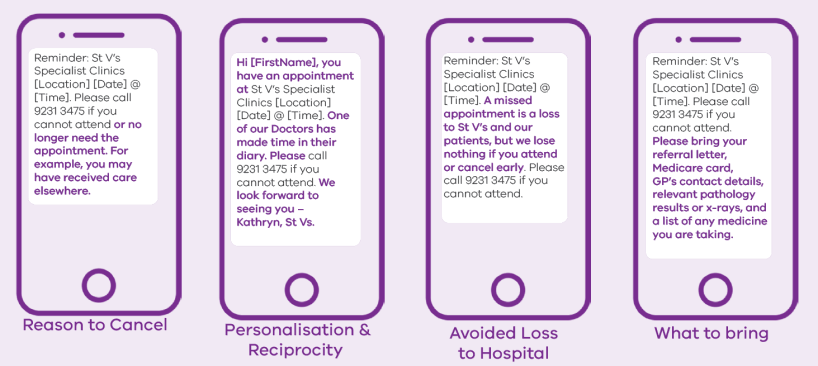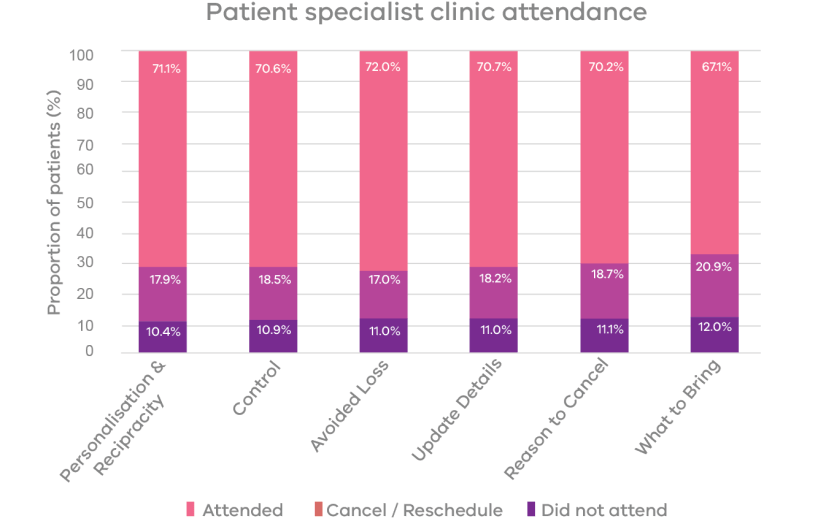The behavioural challenge
Missed appointments are a significant cost to the health care system, and patients who do not attend appointments miss out on valuable care.
What we did
We partnered with the Department of Health and Human Services and several health services to improve patient communications as part of a new Communications Toolkit for health services.
To understand what works, we designed a range of behaviourally-informed SMS reminders and letters to reduce the number of patients who do not attend hospital appointments.
First, we partnered with St Vincent’s Hospital Melbourne to run a randomised controlled trial to test several SMSs sent ahead of specialist clinic appointments.
All patients received an SMS, with the “control” group message being the current SMS used by St Vincent’s.
![Phone with Reminder: St V’s Specialist Clinics [Location] [Date] @ [Time]. UR [URN]. Appointments are very valuable, call 9231 3475 if you cannot attend so we can give it to someone else that needs it.](/sites/default/files/2019-07/SMS-control-behavioural-insights-specialist-clinics_0.png)
Taking stock of what we learned from this first trial, we ran four other trials:
- With St Vincent’s Hospital, we built on the most successful SMS reminder and tested a new reminder letter;
- With Eastern Health, we tested a new SMS highlighting the financial cost of missed appointments to the hospital;
- With Northern Health, we tested a new reminder letter; and
- With Western Health, we tested distributing appointment letters via SMS.
The SMSs
Control SMS: Reminder: St V’s Specialist Clinics [Location] [Date] @ [Time]. UR [URN]. Appointments are very valuable, call 9231 3475 if you cannot attend so we can give it to someone else that needs it.
Reason to cancel SMS: Reminder: St V’s Specialist Clinics [Location] [Date] @ [Time]. Please call 9231 3475 if you cannot attend or no longer need the appointment. For example, you may have received care elsewhere.
Personalisation & Reciprocity SMS: Hi [FirstName], you have an appointment at St V’s Specialist Clinics [Location] [Date] @ [Time]. One of our Doctors has made time in their diary. Please call 9231 3475 if you cannot attend. We look forward to seeing you – Kathryn, St Vs.
Avoided Loss to Hospital SMS Reminder: St V’s Specialist Clinics [Location] [Date] @ [Time]. A missed appointment is a loss to St V’s and our patients, but we lose nothing if you attend or cancel early. Please call 9231 3475 if you cannot attend.
What to Bring SMS: Reminder: St V’s Specialist Clinics [Location] [Date] @ [Time]. Please call 9231 3475 if you cannot attend. Please bring your referral letter, Medicare card, GP’s contact details, relevant pathology results or x-rays, and a list of any medicine you are taking.

What we found
From this first trial at St Vincent’s we learned that the Personalisation & Reciprocity SMS appears most effective at reducing the number of patients who do not attend hospital appointments (see the graph on the right).
We also learned that patients engaged more with the Personalisation & Reciprocity SMS. The patients who received this SMS were twice as likely to reply “Thank you”, “Yes” or “I’ll be there” compared to other SMSs.
Health services may better engage patients before appointments by personalising their SMSs and highlighting that the doctor has scheduled time for the patient.

Scaling up learnings
In October 2019, the findings from our trials at St Vincent’s Hospital, Western, Eastern and Northern Health services were published in a new Communications Toolkit for health services(opens in a new window).
Our findings will help health services better engage with patients by shedding light on some key questions such as:
- What is the most cost-effective channel to remind patients about upcoming appointments?
- What behavioural insights concept is the most effective at changing patient behaviour?
- What is the best time to send reminder messages?
Thanks
We thank our partners Department of Health and Human Services, St Vincent’s Hospital, Western, Eastern and Northern Health services.
Updated